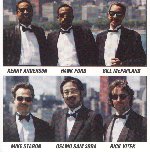
The Chicago Horns:
Bill McFarland,
Hank Ford & Kenny Anderson
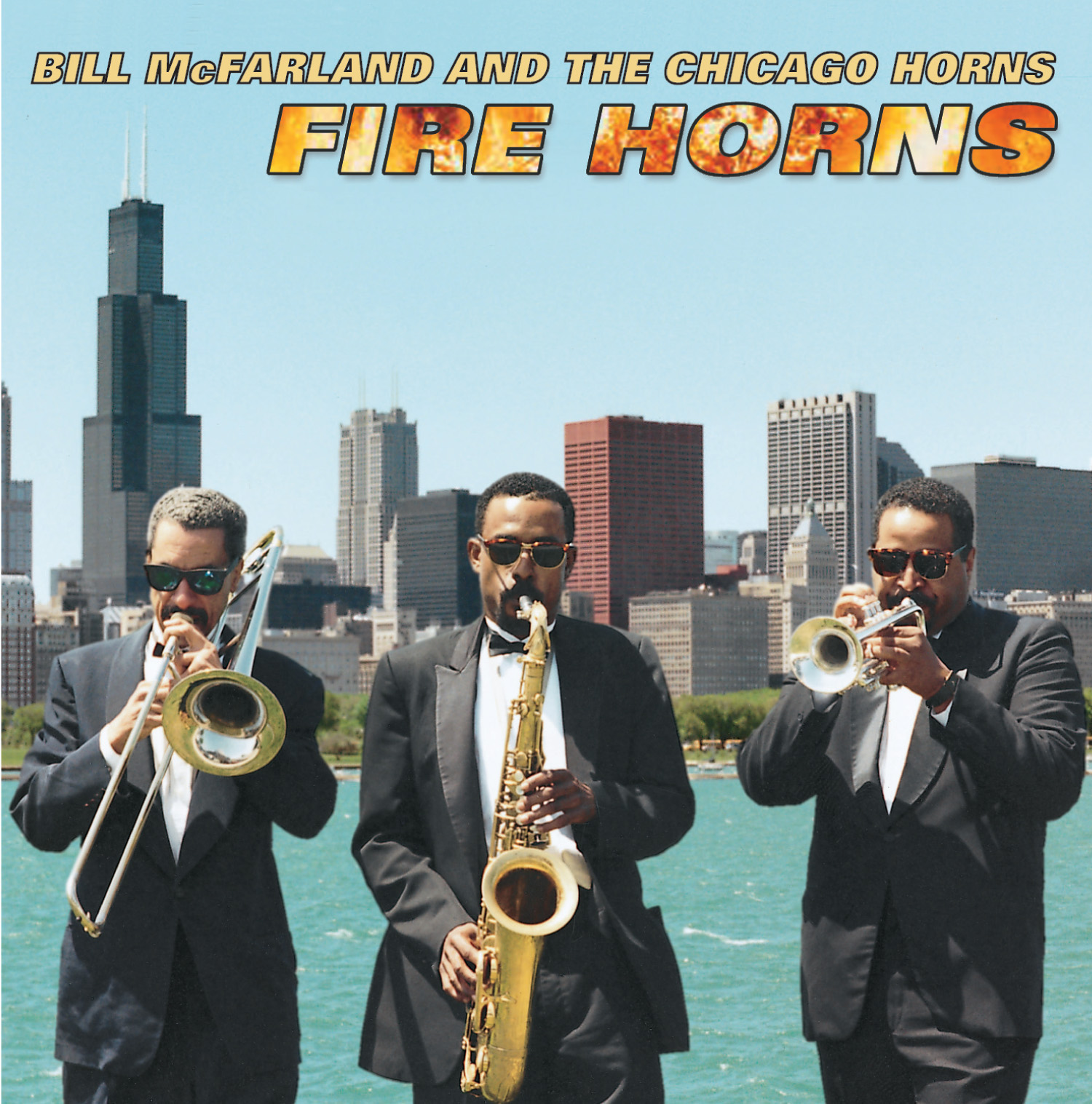
The Chicago Reader Magazine
Critics’s Choice
Article By:
World Renowned Writer: Neil Tesser
Winter/1996
You almost can’t go wrong with a lineup like Bill McFarland’s: a potent, hard-driving outfit that matches his throaty trombone with a beef-stew saxophonist, in this case Hank Ford or a fluent, octave-stretching trumpet ace named Kenny Anderson. This kind of three-horn sextet first appeared in the 1940’s, as a bebop miniaturization of the big bands that had dominated the swing era. It disappeared for most of the next decade – in part because of the paucity of trombonists able to handle the technical demands of bot – but it reached it’s zenith when Art Blakey expanded his Jazz Messengers to a three-horn line in the 1960’s.
The Messengers offer an obvious model for McFarland’s band. But so does the music of the Jazz Crusaders ( and not just on those tunes where electronic keyboards replace the standard piano). Several of the songs on the Chicago Horns’ fine debut – “Fire Horns” (Sopro Records) – show the lighter swing, the comparatively relaxed melodies and the pop-soul song structure that made the Crusaders one of the most popular jazz bands of the late 1960’s.
Both the Messengers and the Crusaders always featured strong piano personalities, and in this respect McFarland again brags on his roots: you needn’t go any further than the album’s opening track, the McFarland composition (and Chicago’s deceased-mayoral dedication) “Harold The Great,” which depends on the crisp and imaginative piano fills by Osamu Sam Soda as much as it does on the three horns. Soda leads a sparkling rhythm section, with bassist Mike Staron and drummer Rick Vitek, who dances the tightrope between timekeeping and pure energy. Meanwhile, the horns themselves fit the music and each other as tight as O.J.’s gloves.
(By the by, McFarland and Anderson both lend their estimable talents to Africa Brass, the gleaming locomotive of a band conducted by Malachi Thompson.)
FIRE HORNS ALIVE & LIVE
Recorded Live @ Green Dolphin Street Jazz Club / Chicago
Recorded Live @ The Green Mill Jazz Club / Chicago
Studio Recording @ Chicago Trax Studios / Chicago
Bill McFarland – Trombone (Tracks 1-8)
Hank Ford – Saxophone (Tracks 1-8)
Kenny Anderson – Trumpet (Tracks 1, 2, 4-8)
Kirk Brown – Piano (Tracks 1-5, 8)
Yosef Ben Isreal – Bass (Tracks 1, 2, 4, 5)
Y.L. Douglas – Drums (Tracks 1, 2, 4, 5)
Eddie Chappell – Vocals (Track 4)
Bernard Reed – Bass (Tracks 3, 6, 7, 8)
Toby Williams – Drums (Tracks 6, 7)
Herb Walker – Guitar (Tracks 6, 7)
Vince Willis – Piano (Tracks 6, 7}
Vince Agwada – Guitar (Tracks 3,8)
Asa Watkins – Drums (Tracks 3, 8)
All Songs Produced by: Bill McFarland
Mastered by: Pat Doody / PDS Studios
Executive Producers and Management:
Bud Monaco / Red Rose – Sopro Records
Live Recording Engineer / Green Dolphin:
Dave Freeman
Live Recording Engineer / Green Dolphin:
Kirk Brown
Studio Engineer / Chicago Trax:
Freddy Brietberg
Photography by:
SoproFoto / Bud Monaco
Sopro Webmaster & Website Design by:
Steve Goodey
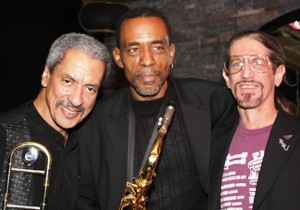
Bill McFarland and The Chicago Horns are alive and well hitting the streets, jazz clubs and airwaves of America with their second CD release on Sopro Records. The Chicago Horns are kicking out the jams with this CD release, aptly named, ‘Fire Horns Alive & Live’. The CD contains eight outstanding tracks. Four of the tracks were recorded ‘live’ at two of the world’s most renowned Chicago Jazz clubs, The Green Mill Jazz Club and Green Dolphin Street Jazz Club. The other four tracks are studio recordings exquisitely recorded at Chicago Trax Studios. Bill McFarland produced all of these outstanding tracks with the engineering help of Freddy Brietberg at Chicago Trax, Dave Freeman at Green Dolphin Street and Kirk Brown at The Green Mill.
‘Alive & Live’ is the follow up to their successful debut CD release ‘Fire Horns’ produced by Bill McFarland and the legendary Paul Serrano, which has received critical acclaim by some of the top jazz writers in America. These writers include Neil Tesser, Howard Reich, Lloyd Sachs, Jay Harvey, Terrance Flamm, Nort Johnson and David Alan Buco. All of these reviews can be seen and read on The Chicago Horns website located at www.sopromusic.com along with further bios, photos, artwork and sound samples of the ‘Fire Horns’ and ‘Alive & Live’ CD’s. With the release of ‘Alive & Live’, Bill McFarland and The Chicago Horns are once again showcasing their dynamic and unique jazz music talents. Accompanying them on this great new musical journey are some of the most outstanding jazz musicians of our time. The song writing of The Chicago Horns group and associated musicians continues to exemplify their strong musical attributes, their writing and production talents on their original songs and their exceptional re-creations of three timeless and beautiful Jazz standards.
Bill McFarland Chicago’s Slide Trombone Legend, Kenny Anderson the Mid-west’s Trumpet Titan and Hank Ford the Saxophone sensation of the nation, have taken their combined musical genius of brass horns, harmonics and song and once again have created their own, ‘Statement of Jazz’. They are now driving it right into the new millennium. Along with an all star cast of great writers, musicians and outstanding live performers, The Chicago Horns CD release, ‘Alive & Live’ is the jazz album to take you into the new millennium with song, style, grace, love and peace.
The re-creation of the timeless jazz standard ‘Black Nile’, written by Wayne Shorter, is a strong statement by The Chicago Horns that they can lean back into the past and bring a great song into the new millennium. The Chicago Horns do this with taste and style as it was created by the prolific Shorter. The track was recorded live at The Green Mill Jazz Club featuring the same musicians as ‘Mar-Di-Gras’.
‘Bonito Seniorita’, written and performed brilliantly by Pianist Kirk Brown was recorded at Chicago Trax Studios. ‘Bonito Seniorita’ is a catchy and wonderful song that showcases Kirk Brown’s outstanding Piano talents. Joining The Chicago Horns with a great rhythm section performance on this track are Bassist Bernard Reed and Drummer Asa Watkins along with Guitarist Vince Agwada.
‘Bye Bye Blackbird’, written by the world-renowned duo of Mort Dixon and Ray Henderson, is taken to another level of perfection by The Chicago Horns. This timeless jazz classic has a rare and unique vocal track that has not been found on previous Chicago Horns recordings or performances. The vocals on ‘Bye Bye Blackbird’ are beautifully sung by vocalist Eddie Chappell and will take you back to the early years of great jazz vocalists with Eddies Chappell’s quality and scat-type approach on his vocal performance. ‘Bye Bye Blackbird’ was recorded live at Green Dolphin Street.
The first track on ‘Alive & Live’, is a re-arranged version of ‘Mar-Di-Gras’ which was recorded on The Chicago Horns debut CD release ‘Fire Horns’. This track was recorded live at Green Dolphin Street Jazz Club. Written and performed by Trombonist and band leader Bill McFarland with Kenny Anderson on Trumpet and Hank Ford on Saxophone along with Kirk Brown on Piano, Bassist Yosef Ben Isreal and Drummer Y. L. Douglas. ‘Mar-Di-Gras’ will make you feel like your are taking a stroll down Bourbon Street as if your were there at midnight with a full moon shining brightly overhead during Mardi Gras in famous old New Orleans.
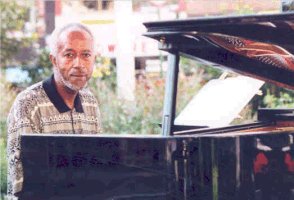
Kirk Brown
Kirk Brown performs on the Piano
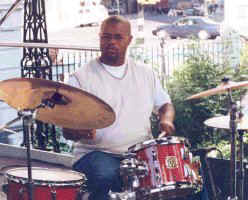
Y. L. Douglas
Drums
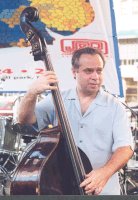
Yoseph Ben Israel
Yoseph Ben Isreal on Bass

Taking another great jazz standard into the new millennium with perfection is exactly what The Chicago Horns do in their re-creation of the great jazz song ‘Impressions’ written by the legendary John Coltrane. This track was recorded live at Green Dolphin Street with Kirk Brown on Piano, Yosef Ben Isreal on Bass and Y. L. Douglas on Drums. Kenny Anderson’s Trumpet is highlighted on this track and he continues to show his Trumpet playing brilliance with a dazzling performance.
‘Magoo’, written by Bassist Bernard Reed, is a wonderfully written and performed song that again shows the dynamic sounds of The Chicago Horns. Bernard Reed performs flawlessly on the Bass and Toby Williams on Drums rounds out the rhythm section with exceptional ease. Guitarist Herb Walker adds his majestic Guitar tones to the track along with the addition of Chicago Jazz great Vince Willis on Piano. ‘Magoo’ was recorded at Chicago Trax Studios.

Saxophonist Hank Ford adds his trademark writing and playing performance on ‘Scat’. Hank’s consummate saxophone qualities and tones along with Vince Willis’ wonderful Piano solo is a pleasure to feel and hear. Bassist Bernard Reed and Drummer Toby Williams add their magical rhythm section touch to the track along with Guitarist Herb Walker. ‘Scat’ was recorded at Chicago Trax Studios.
The crowning achievement of writing, performance and recording on The Chicago Horns ‘Alive and Live’ CD release is the beautiful and majestic song ‘Cease For Peace’. Written and performed by Bassist Bernard Reed and co-written with his brother D. Reed with the Horns arrangements by Bill McFarland. ‘Cease For Peace’ is a worldly proclamation and a powerful statement of peace and world unity in our present time of life throughout the world. The many musical changes throughout the song plays out in harmonic melodies with the dynamic sound of The Chicago Horns interwoven together in a unity of Brass power and viscerally exciting piano, guitar and rhythm section tones. ‘Cease For Peace’ takes the listener from quite moments of life, thought, time and place to cachophonis three part horn sections with interwoven melodies of harmonic tones beautifully accompanied by Vince Agwada’s perfect guitar tones along with Kirk Brown on Piano and Asa Watkins on Drums. Agwada’s guitar performance is reminiscent of Jimmy Page’s guitar virtuoso as he performed on his classic song ‘Kashmir’, with crescendos of power and sliding back to beautiful jazz tones as jazz guitar masters have previously done. The ending vocal statement by Bernard Reed will reach down to the heart and cut down deep into the soul of the listener. Bernard’s vocal statement strikes out dramatically at the listener and is reminiscent of the great story telling song style and vocal statements of jazz great Lou Rawls and the legendary song writing of Marvin Gaye. Bernard’s vocal statement is a statement of love, world peace and that we must all unite together to save the children of the world, for they will be the future of the world. ‘Cease For Peace’ is a New World Anthem of music that will surely touch the heart, the soul and send a message of peace and love to the universe as a call to arms for world peace for humanity.

